#Hard Brexit
Photo

I couldn't agree more.
Hard Brexit was defined by the UK leaving both Customs Union and Single Market. Which it arguably did (with the of NI, the only region of the UK not in economic decline right now), but there was always one fundamental problem with this maximum Brexit!
While the US is the definitive military super power on the planet, the EU has quickly established itself as the definitive trading super power, effectively shaping the rules of global trade.
Rules unacceptable for Britain! ⚠️
Since it became clear that the EU isn't going to dissolve anytime soon and the rest of the world seems happy obeying with these un-bureaucratic, and un-British, European rules. The only logical post Brexit future is for the UK to leave!
We need to shoot this island into space 🚀, it is the only way!
2 notes
·
View notes
Text
Hard Brexit Vs Soft Brexit
Hard Brexit Vs Soft Brexit
The main differences between Hard Brexit and Soft Brexit concern the terms of trade. In a Hard Brexit, the UK would be leaving the single market & the customs union, resulting in increased bureaucratic checks on goods. In a Soft Brexit, the UK would continue to be part of the single market but would have fewer rules governing its borders.
Leaving the customs union would mean increased…
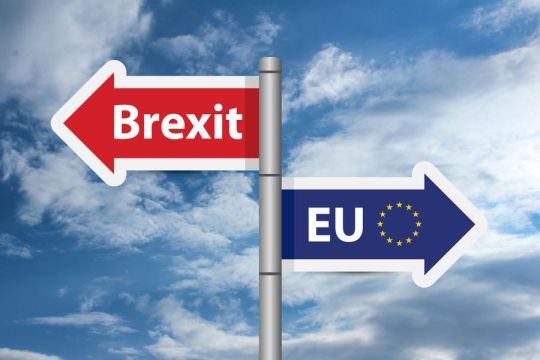
View On WordPress
0 notes
Text
A Brief Summary of Scotland's Anger
Some of you may have heard that England has blocked Scotland's gender reform bill. Others may have seen the demands for dissolution of the union as a result. Please allow me to sum up the anger as impartially as I can:
Historically, the Scottish hate the English for a variety of reasons: see the Jacobite Uprisings and the Clearings. But this is about modern politics, so let's start there.
Essentially the SNP, the ruling political party in Scotland, have been trying for YEARS to get a referendum result where the Scottish people vote to leave the United Kingdom. In 2014, David Cameron (the then prime minister of the UK) gave permission for a referendum to be held, and 55% of the population voted to remain in the UK. Some of the reasons for staying was the economic stability from using the pound sterling currency and being able to stay in the EU, as well as access to funding from the rest of the UK (the arguement being that Scotland could not afford to support itself without help from Westminster).
Since then, the SNP and some of the other, smaller parties have argued that the initial result of the 2014 referendum was not strong enough, and that the initial promises made to the Scottish people are no longer valid (see Brexit and the recent economic crisis for the big examples, but there are others). Recently, the SNP has even taken the matter of the right to hold a second referendum to the Supreme Court, the highest court in the UK and one that deals mostly with English cases. The court ruled that, based on the current laws and treaties, Scotland needed permission from Westminster to hold another referendum. This has angered many people, regardless of if they want to stay or remain, and this latest action against Trans Rights could put more pressure on Parliament.
Scotland, as a country, has always been slightly more to the left of the political spectrum than England, which has led to many political conflicts where England just pulls rank to 'resolve' the issue. For example, Scotland HATES having nuclear weapons, and the UK's nuclear submarines are based on the west coast of Scotland. Another example is in the NHS, where prescriptions are free in Scotland but a flat rate in England. Nicola Sturgeon (leader of the SNP) had wanted to put Scotland in lockdown earlier than England and had even set up a different way out of lockdowns that was more gradual, but it ended up being watered down into 'Scotland had to wear masks for longer than England'.
Now, the Gender Recognition Bill removes many barriers for trans healthcare, such as how long an individual has to self-identify as a different gender to the one they were assigned at birth, lowering the age at which an individual can change the gender on their birth certificate to 16, and removing the need for a gender disphoria diagnosis. The gender disphoria diagnosis is one of the biggest barriers for trans healthcare in the UK at the moment, as a referal to even get the chance to be diagnosed can take years, and people have died on the waitlist just for a first appointment. For a more in-depth look at the issues surrounding trans healthcare in the UK, I recommend Abigail Thorn's video essay titled 'I Emailed My Doctor 133 Times: The Crisis In the British Healthcare System' (https://www.youtube.com/watch?v=v1eWIshUzr8). Fair warning, it will make you furious.
The Gender Recognition Bill was passed by the Scottish Parliament, also known as Holyrood, by 86 votes to 39. That's pretty good for a bill like this, but the UK Parliament has prevented this bill from receiving 'royal assent', which is required to make the bill enforcable. This has angered a lot of people, as it could be seen as England blocking the will of the Scottish people. Unfortunately, Scotland cannot leave the UK without permission. This is why there has been so much emphasis on a referendum, as the result could put pressure on the UK Parliament. England is reluctant to give permission, and one of the main reasons floated for this are the oil fields in Scottish waters.
TLDR: Scotland has always been annoyed at England, and the latest action to block this bill could tip those bad feelings over into full on anger, revolt and revolution.
#scotland#england#uk politics#transgender rights#trans rights#dissolution#revolution#scottish independence#Brexit#uk#parliament#holyrood#westminster#Honestly it was hard not to get angry writing this#The current system for trans care in the uk is broken#lives are being lost#and england is throwing a tantrum because they dont want to change#tell me this isnt about control#long post
690 notes
·
View notes
Text

American Asterix Brexit reference.
Here’s the British and French versions as well if anyone’s interested (again apologies for the poor French quality):


#american translation#Asterix#Obelix#‘two welsh?’ is also really funny#but brexit came out of left field for me I laughed so hard
12 notes
·
View notes
Text

day in the life of a true brexit geeza. wake up and meet the wife rocky. my little princess isnt he bootiful. time to go to race 2. revvv up the engine wheyyyy
#my art#fanart#starlight express#stex#brexit the british engine#rocky 1 stex#rocky 1 the boxcar#the rockies stex#can u tell i dont know how to tag him#oh god whats their ship name#brocky#brexit x rocky#brexit x rocky 1#they deserved to race!!!#i know the british engine breaks down to give mama/papa and rusty a place in the race but.#also if ur not familiar with stex im sorry i swear im not some country humans freak hes a train i promise hes a train hes a train from engl#hes in a worldwide race thats why he has the flag on him pls pls pls#in other news. im never drawing a rocky ever again why do they look like that its so hard to draw whyyyy
67 notes
·
View notes
Text
might get to go to mainland europe for the first time in like six years this is so exciting
#even more so bc there are RUINS there which I've since studied in my architecture classes at university!!!!!!!!#<- this is entirely dependent on my parents bc I'm tagging along on their trip but I will try to convince them about at least some ruins#& Also maritime museums but that's less hard bc my dad will go with me to literally any maritime museum ever in a heartbeat#thoughts#wild tho bc last time I was there was pre brexit so extremely weird to visit & not be part of the eu anymore
32 notes
·
View notes
Text
writes "get fucked" in reply to a survey question about small boats
#i literally cant think of a single person who actually cares about 'the small boats issue' that much#like of course im all for asylum seekers having safe passage and ways to travel and those small boats are not it#but the 'issue' being proposed here is 100% about stopping people from coming at all and ULTRA criminalising small boats#like there are SO many other problems which should take precedent over the iSsUE??#of some poor souls choosing to take a dinghy across the english channel in november lol#same thing about how hard the UK govt atm are pressing the Rwanda issue#there are uhhhh more important things to consider#over if its TECHNICALLY okay to deport refugees to fucking Rwanda despite it being REALLY suspect#im ssssooo done with strawman problems#its like Brexit and the 'EU question' all over again#care about more important things you tory cunts !!!!#capitalism is a death cult !!!!!!#rory's ramblings
2 notes
·
View notes
Text
just finished the last paper I will probably ever turn in as an undergraduate and I just have to say that I fucking hate writing papers 😭
#unless it's literary/film analysis....I just can't#tell me why I was writing a paper about brexit and right wing populism for my one professor that's litcherally english!?!?!?#why did I think that was going to be a good paper topic#they are going to be judging me HARD
5 notes
·
View notes
Note
who wants to bet niall has posted a photo with harry in his close friends
not me, u know the closest friends NEVER take pics/have pics together
4 notes
·
View notes
Text
ummmm yeah just eyeballing italian politics and the favourable projections for actual neofascists in sept — genuinely starting to wonder if i should go for irish tri...un...al? citizenship
#centrists betraying left parties leading to the rise of fascism?#shockedpikachu.jpg#like idk...i thought about it after brexit but i'm thinking hard now
3 notes
·
View notes
Text
It’s anti-democratic to not clarify criteria for a Border Poll – Irish Border Poll
https://irishborderpoll.com/2022/05/28/its-anti-democratic-to-not-clarify-criteria-for-a-border-poll%ef%bf%bc/
Scotland, Wales and the North of Ireland have refused to give consent to Brexit – but Westminster isn’t listening!!!
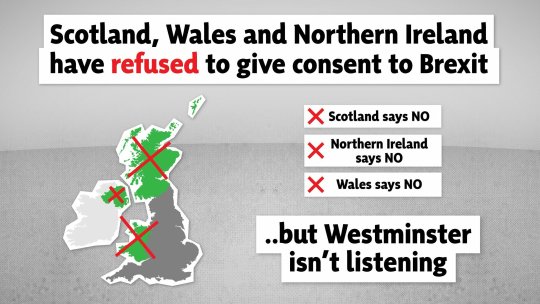
View On WordPress
#Border Poll#Brexit Sea Border#Celtic Nations#irish unity#NI Protocol#No hard border on the Island of Ireland#One Ireland One Vote#United Ireland
2 notes
·
View notes
Text
"This game is not displaying fascism enough, it's pulling the punches on fascism, because it's not incorporating true elements of white supremacy. It feels like it's drawing back from racism, probably as to not upset its players."
It's a game set in Britain where other Europeans are being discriminated against, and the reason you think it's not fascist enough is because you're an American who's been led to believe that racism can only appear in forms of discrimination against black people, not white people of other nationalities. Heck, not even against white people in general.
I don't even agree with every political element/postulation of the game, though admittedly, I don't know what it's like in Britain enough to know how accurately it's captured the opinion of most people. What I do know is that it's actually a dumb take to say the game is pulling punches with fascism because it's not taking the extra step of "white supremacy."
To the people who live in Europe, I'm pretty sure it felt racist enough. And I think it was pretty necessary to show that other forms of racism do, in fact, exist.
#The game is Not Tonight#and was a Papers Please styled game set after Brexit#basically putting forth the worst Britain would become because they left the European Union#Fascism -even modern fascism- is not defined by how black people are treated#specifically#Fascism is not predicated around white versus black#it *can* be#but that does not mean it *is* and that every depiction of it *has* to use that form of racism#not every game highlighting oppression has to be about oppressed black people#other people can feel oppression#other sects of people can be discriminated against#it should not be that hard to understand
1 note
·
View note
Text
The EU’s 🇪🇺 Liberals Need Better Ways To Deal With Populists! Demonisation Isn’t Working
— September 14th, 2023 | Leaders | The Real Threat From Europe’s Hard Right
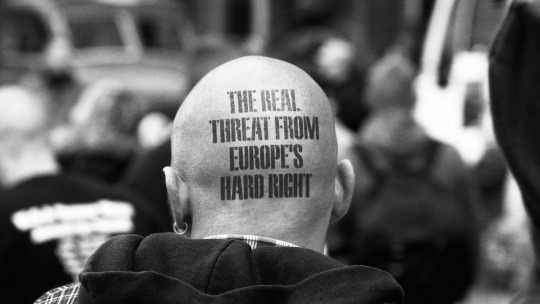
NPD Demonstration on the 8, May 2005, 60 Years of Ending of the World War II. Image: Justin Metz/Getty Images
Aspectre is Haunting Europe: the spectre of a rising hard right. In Germany the overtly xenophobic Alternative for Germany (AFD) has surged to become the country’s second-most popular party. Its success is polarising domestic politics and it seems poised to triumph in state elections in the east next year. In Poland the ruling Law and Justice Party is leading the polls ahead of a general election on October 15th, and it is being drawn further to the right by an extreme new party, Confederation.
As we explain in this week’s Briefing, there could be more grim news to come. Next year the hard right could gain more sway in elections for the European Parliament, due to be held in June. Marine Le Pen, the leader of National Rally, could win the presidential election in France in 2027. If she did, France would become the second big country to be run by the hard right, after Italy, where Giorgia Meloni and her Brothers of Italy took power last year in a coalition with the Nativist League.
Make no mistake, Europe is not about to be overrun by fascists, in a repeat of the 1930s. But the new right-wing wave presents a big challenge. Handled badly, it could toxify politics, disenfranchise a large share of voters and prevent crucial reforms of the European Union (eu). Rather than trying to exclude hard-right parties entirely from government and public debate, the best response is for mainstream parties to engage with them, and on occasion do deals with them. If they have to take some responsibility for actually governing, they may grow less radical.
Europe’s hard right has enjoyed several surges over the past quarter of a century. In 2000 Jörg Haider, an anti-establishment demagogue, shocked the continent by entering government in Austria: his Freedom Party is now the most popular there. A migration crisis in 2015, when over 1m people from poor and war-torn countries crossed the eu’s borders, led to another wave of support for xenophobic and Eurosceptic parties, including Britain’s Brexiteers.
The new wave that is breaking is different in three ways. First, the hard right has opportunistically found new topics to drum up fury about. Most such parties are still anti-foreigner, but having seen Britain’s experience, some have moderated their hostility to eu membership, and fewer want to ditch the single currency. All are animated by new concerns, most obviously hostility to pro-climate policies, which they argue are an elitist stitch-up that will fleece ordinary people. In Germany the afd has successfully mobilised opposition to a government push to require people to install expensive heat pumps in their homes, forcing the government to water down the measures.
The second shift is the breadth of their support. Our calculations show that 15 of the eu’s 27 member countries now have hard-right parties which have support of 20% or more in opinion polls, including every large country bar Spain, where the nationalist Vox did badly in July’s elections. Almost four-fifths of the eu’s population now live in countries where the hard right commands the loyalty of at least a fifth of the public.
The final shift is that the stakes have been raised, particularly at a European level. The war in Ukraine has created a pressing need for the eu to welcome new members in the east, ultimately including Ukraine. In tandem, it will need to streamline decision-making to reduce the veto powers member states wield. The presence of a larger bloc of anti-immigrant nationalists could make that crucial task far harder. Hungary’s Viktor Orban, a guru to other populist-nationalists, has consistently tried to block eu reform. Imagine if he gains more allies.
How should centrist voters and parties respond to the threat from the hard right? The old answer was to erect a cordon sanitaire. Mainstream parties refused to work with the insurgents; mainstream media refused to air their views. That approach may have run out of road; in places it is becoming counter-productive. In Germany the isolation of the afd has reinforced its narrative of being the only alternative to a failed establishment. Mainstream parties cannot pretend for ever not to hear the voice of 20% of voters without eventually corroding democracy.
Meanwhile, there is more evidence that hard-right parties in Europe tend to moderate their views when they have to take responsibility for governing. Exhibit A is Ms Meloni, the first hard-right prime minister of a western European country since the second world war. Despite liberal fears, she has not, or at least not yet, picked fights with Europe, upended migration policy, or restricted abortion or gay rights. She has remained a supporter of nato and Ukraine, by no means a given on the hard right. In the Nordics a similar pattern has played out. The Finns and the Sweden Democrats, two nationalist parties, have become more pragmatic since either joining or agreeing to support a governing coalition.
Any decision to include a hard-right party in local or national government should be taken with extreme caution, especially in places where a history of fascism arouses acute sensitivity. Some rules of the road may help. One is that to be considered, any party must agree to renounce violence and respect the rule of law. Just as important is the constitutional context: at what level of government should they be included? What are the checks and balances created by the electoral system and other institutions? It may make sense to allow the afd to take part as junior members of local-government coalitions in Germany, for example. It would be a disaster if the hard right were to win France’s presidency, with its enormous powers.
Tame or Flame
Last, mainstream parties must accept that they have not done enough to satisfy a large and angry minority of their citizens. Trying to accelerate the green transition by loading people up with costs they cannot afford (Germany’s rules on boilers, for instance, or Emmanuel Macron’s ill-fated attempt to increase taxes on fuel) is just making greenery unpopular. Better communication and compensation for the worst-hit are both essential. Failing to control national borders alienates people, whereas a well-managed migration system could be shown to benefit them. The new success of the hard right in Europe is in part a failure of the centre—so the centre needs to raise its game. ■
— This article appeared in the Leaders section of the Print Edition Under the Headline "The Real Threat From Europe’s Hard Right"
#European Union 🇪🇺#Liberals#Populists#Denomination#Leaders#The Real Threat From Europe’s Hard Right#Alternative For Germany 🇩🇪 (AFD)#Overtly Xenophobic#Poland 🇵🇱 | Ruling Party | Law and Justice Party#Extreme New Party | Confederation#Marine Le Pen | Leader | National Rally | France 🇫🇷#Italy 🇮🇹 | Giorgia Meloni#Jörg Haider | Anti-establishment Demagogue#Freedom Party | Austria 🇦🇹#Xenophobic | Eurosceptic | Britain’s 🇬🇧 Brexiteers#Spain 🇪🇸 | Nationalist Vox | Ukraine 🇺🇦#Hungary’s 🇭🇺 | Viktor Orban#Finns 🇫🇮 | Sweden 🇸🇪 | Democrats#Fascism#Emmanuel Macron
0 notes
Text

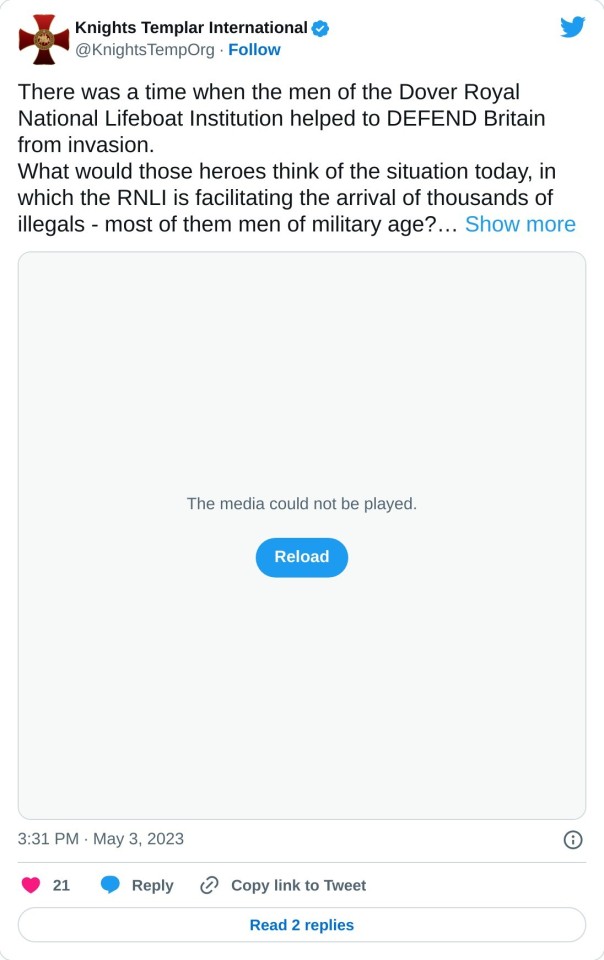
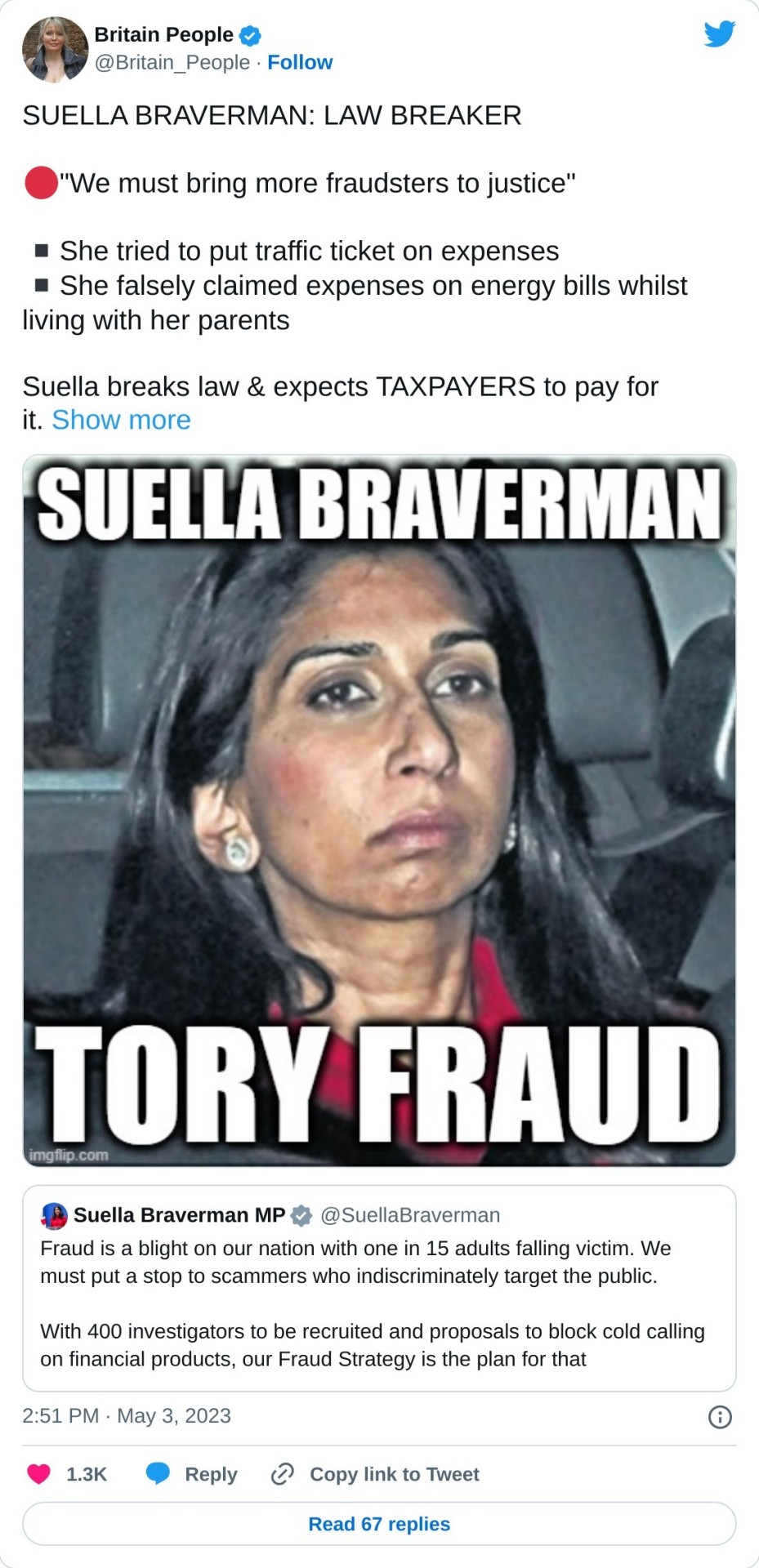
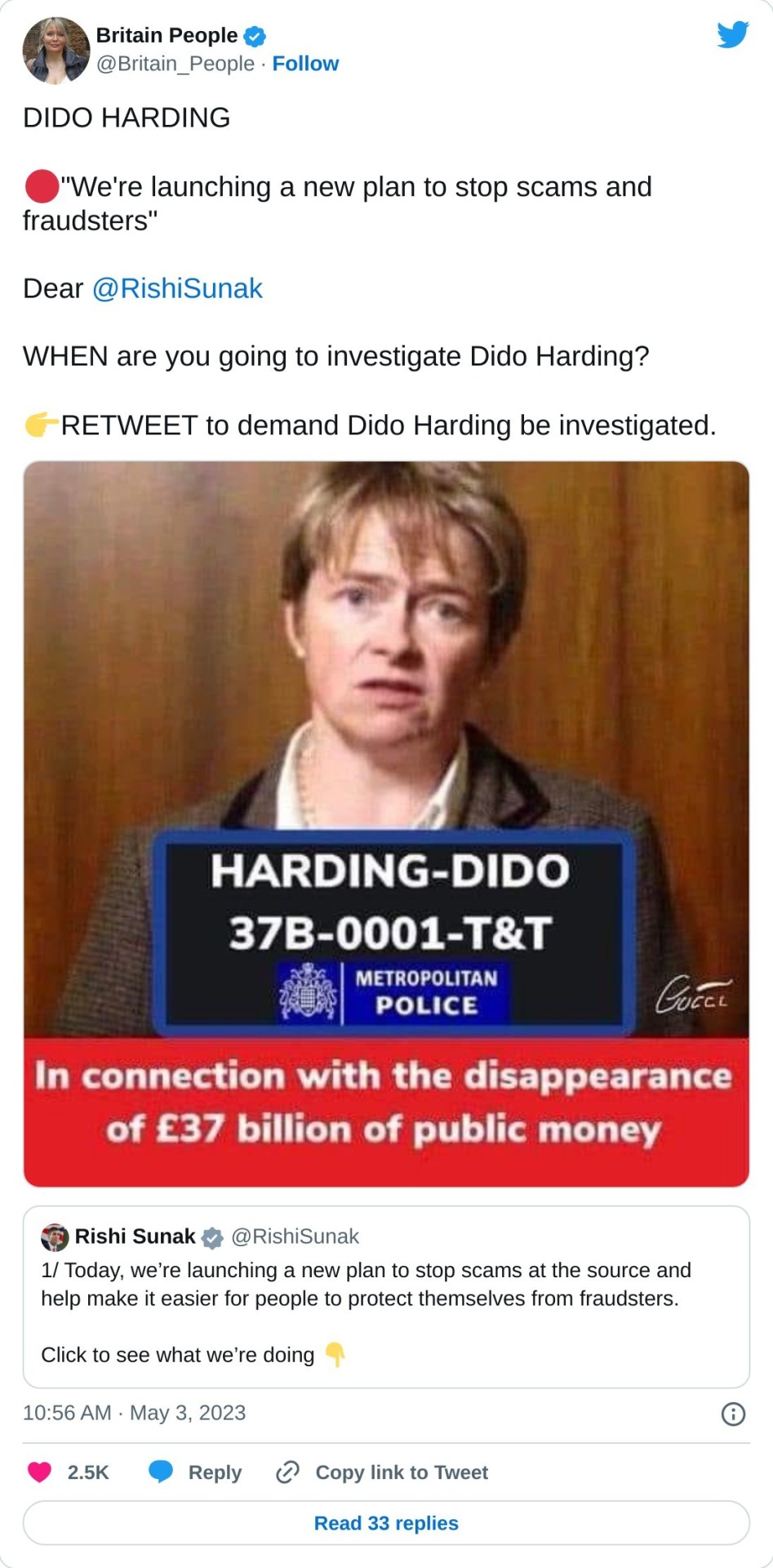



0 notes
Text
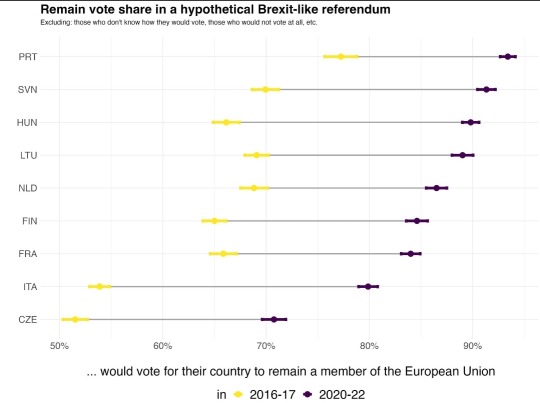
You never go full British.
#European Union#Brexit#euro politics#lol Hungary#(*whispers* those 96 hours of negotiating the Recovery Fund might also have something to do with it)#(Frugals should have their noses rubbed in it often and hard...)
0 notes
Text
The Venn diagram of people who say "if you don't like it then move" when you criticise the UKs entire political system compared to the kinds of people who complain about refugees crossing the channel in small boats is a perfect circle
#if you dont like the uk having a monarchy you should just move!!#they say. forgetting that moving to another country is a massive luxury that most people cant afford to do#and then these same people will demonise people trying to seek asylum in the uk....#like not even moving here bc they prefer the country but bc they see it as a safe haven#pst. people can criticise the political system they were born in and wish it to be better#especially when moving to another country is HARD#i mean especially as im sure a lot of ppl saying 'move elsewhere' at uk republicans were probably brexiters lol....#YEAH YOU KINDA TOOK THE ABILITY TO JUST.... MOVE TO ANOTHER EUROPEAN COUNTRY AWAY FROM US!!!#also ppl crossing the channel in small boats to claim asylum is 100% because we closed all safe legal routes ( o.o)b#open the safe legal routes again and youll reduce the small boat problem lol.....
1 note
·
View note